A report from MIT indicates that as many as "95% of organizations have seen zero returns on their generative AI investments."
Written by: Ye Zhen
Source: The Wall Street Journal
On Tuesday, U.S. tech stocks experienced their worst sell-off in months, abruptly halting a strong rally driven by the AI boom. Doubts about the commercialization returns of AI, combined with bubble warnings from industry leaders, provided a reason for the market's decline, leading investors to flee from high-momentum tech stocks.
In this pullback, the tech-heavy Nasdaq Composite Index closed down 1.4%, marking its largest single-day drop since August 1. Chip giant Nvidia fell 3.5%, while software company Palantir and chip designer Arm plummeted 9.4% and 5%, respectively. The S&P 500 Index also closed down 0.7%.
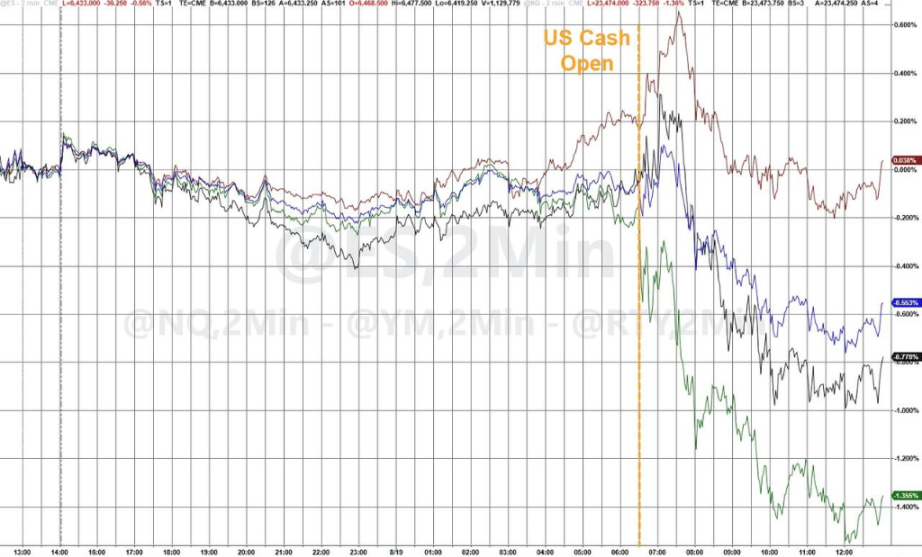
This pullback coincided with growing concerns about the high valuations of tech stocks. According to Bloomberg data, the expected price-to-earnings ratio of the Nasdaq 100 Index is 27 times, nearly one-third higher than its long-term average.
The direct catalyst for the market's nervousness was a report released on Monday by a research branch of the Massachusetts Institute of Technology (MIT). The report stated that as many as "95% of organizations have seen zero returns on their generative AI investments," and that "only 5% of integrated AI pilot projects have generated millions of dollars in value."
Meanwhile, OpenAI CEO Sam Altman recently expressed that he believes investors are "overly excited" about AI, suggesting that a bubble may be forming and that some investors "could lose a lot of money."
These negative signals quickly escalated, impacting the market's optimistic sentiment. A trader close to a multi-billion dollar U.S. tech fund candidly stated, "This (MIT) report scared people."
As AI concept stocks fell, risk assets also faced pressure, with Bitcoin dropping 2.7%, dragging down related cryptocurrency stocks. Funds clearly shifted from the tech sector to defensive sectors, with the Dow Jones outperforming tech stocks on four out of the past five trading days.
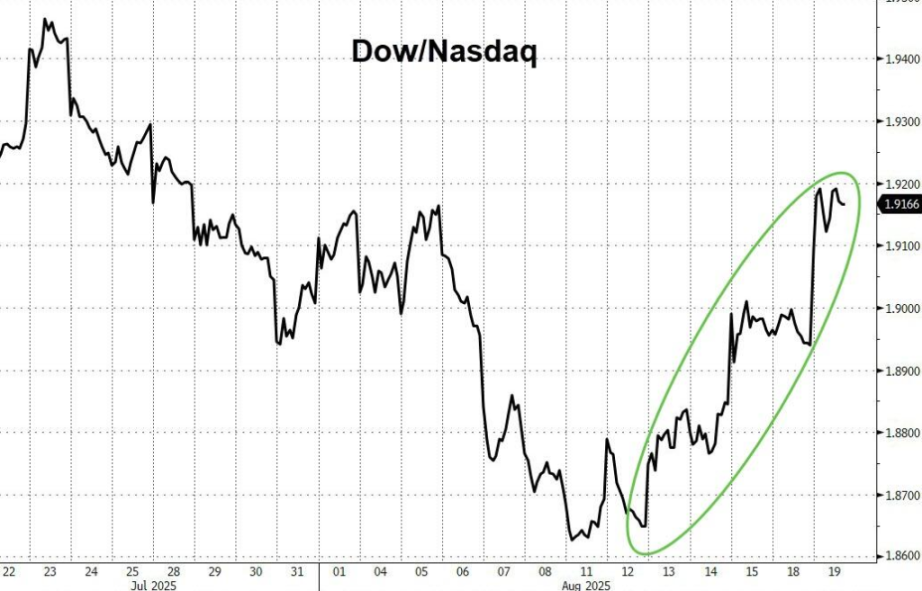
Bubble warnings and return doubts trigger dual bearish sell-off
The AI narrative that has long supported tech stock valuations is now facing a reality check. The points raised in the MIT report are particularly sharp, with its conclusion—"the vast majority of (AI projects) have yet to produce measurable (profit) impacts"—directly challenging the market's widespread expectation that AI will quickly translate into corporate profits.
As previously mentioned by Wall Street Insights, Altman has also issued warnings about an AI bubble. As a "flagbearer" of the current AI wave, he likened the current frenzy to the dot-com bubble of the past, suggesting that history is repeating itself. He told the media, "When a bubble occurs, smart people get overly excited about a core truth." He acknowledged the importance of the internet but pointed out that "people have become overly excited."
Although he also expressed great confidence in the long-term value of AI, his warning that "some will lose an astonishing amount of money" undoubtedly heightened short-term concerns among investors.
Analysts believe that this information collectively "scared" market participants, becoming a key factor triggering the sell-off.
"High-momentum" trading retreats, tech stock leaders broadly decline
Tuesday's decline was concentrated in this year's strongest "high-momentum" stocks. Since mid-May, the S&P 500 Information Technology Sector Index has risen 14%, largely thanks to AI-related companies. However, the stocks that led the decline on Tuesday were precisely these former stars.
In addition to Nvidia, Palantir, and Arm, Oracle and AMD, two large-cap stocks that have performed at the top since mid-May, saw their prices drop 5.9% and 5.4%, respectively. Advertising technology company AppLovin also fell 5.9%. According to Bloomberg data, tech giants including the "Mag7" and popular momentum stocks among retail investors all faced significant declines.
Over the past five days, Mag7 stocks have sharply dropped, while the S&P 493 Index remained relatively flat.
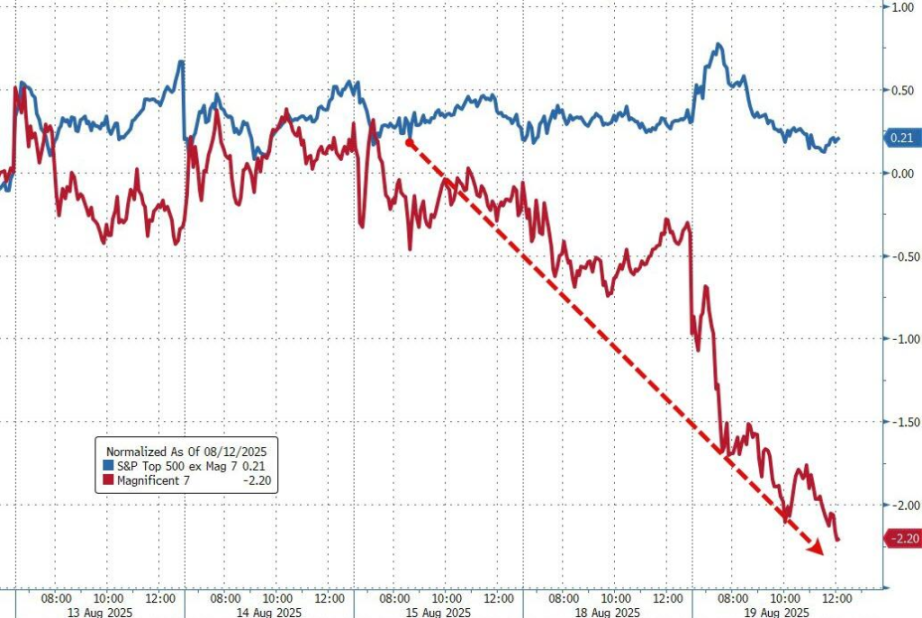
Jacob Sonnenberg, a portfolio manager at Irving Investors, commented, "The market has been in a hot state—today you saw funds rotating out of many very hot, high-momentum stocks." This indicates that the market's decline was not a indiscriminate sell-off, but rather a concentrated profit-taking and style switch.
Risk aversion rises, funds flow into defensive sectors
While tech stocks faced sell-offs, the other side of the market exhibited clear risk-averse characteristics. Funds flowed out of high-risk tech sectors and into traditionally defensive areas. Sectors such as consumer staples, utilities, and real estate rose against the trend. In fact, about 70% of the S&P 500 Index components closed higher that day, highlighting the structural characteristics of this decline.
The bond market also confirmed this trend. As risk assets came under pressure, U.S. Treasury prices rose, leading to lower yields.
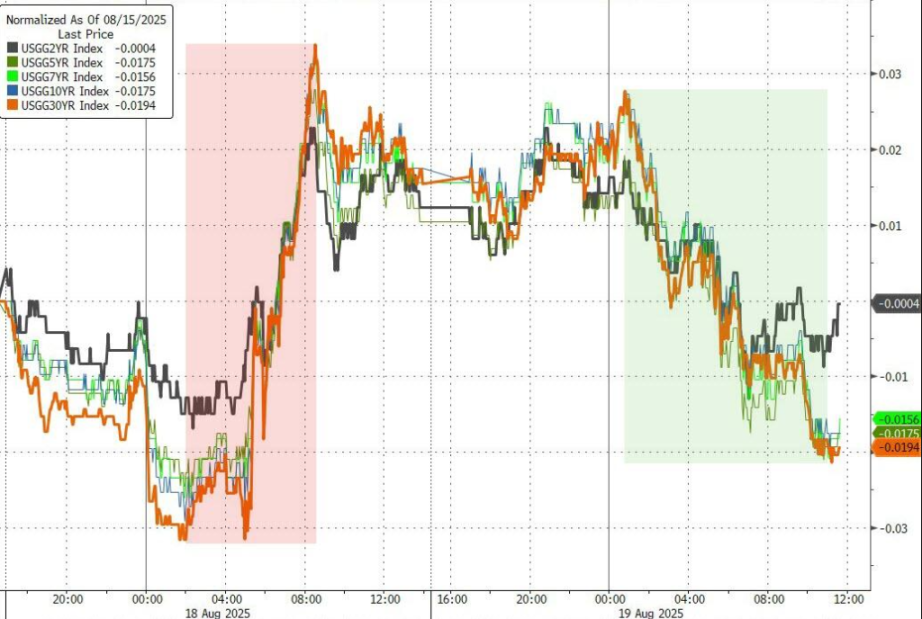
Meanwhile, other risk assets were not spared. Bitcoin prices fell, hitting a near three-week low, and for the first time since June, dropped below the 50-day moving average. As overall market risk appetite declined, gold and oil prices also saw declines.
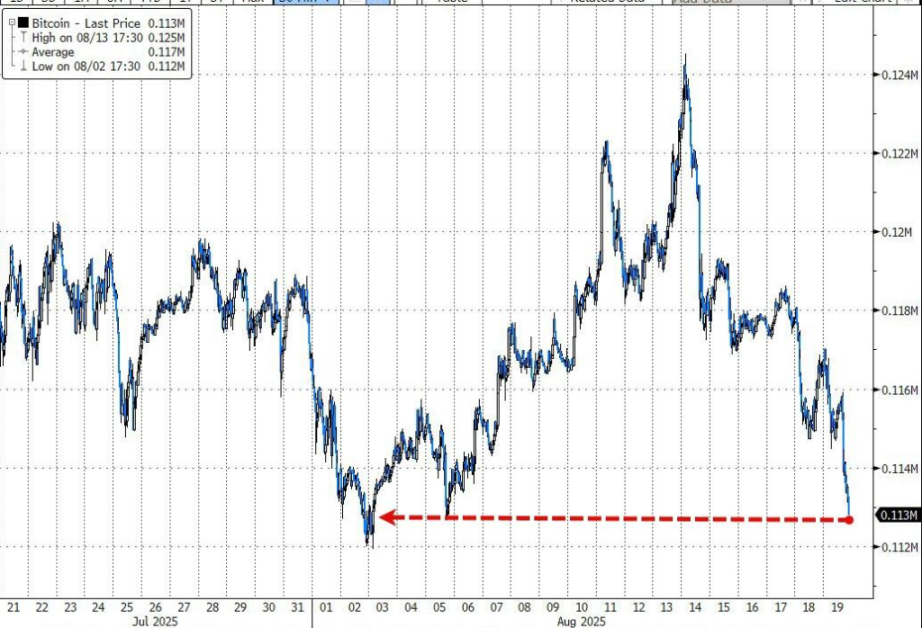
Investor sensitivity highlighted
This is not the first time the market has shown sensitivity to the potential risks of AI.
In January of this year, a technological advancement announced by Chinese AI company DeepSeek briefly shook the market, as it seemed to achieve excellent performance with computing power far below that of U.S. competitors, raising doubts about the dominance of U.S. companies in AI and chip demand. Although the market quickly recovered at that time, this incident indicated that investors are highly alert to any negative news regarding AI.
Looking ahead, the market is closely watching upcoming key events.
The Jackson Hole Global Central Bank Annual Meeting, attended by Federal Reserve officials, and the earnings report from AI chip leader Nvidia will become the next important test of market sentiment. Investors will focus on the Federal Reserve Chair's speech and whether Nvidia can reignite market confidence in AI with its performance and guidance.
免责声明:本文章仅代表作者个人观点,不代表本平台的立场和观点。本文章仅供信息分享,不构成对任何人的任何投资建议。用户与作者之间的任何争议,与本平台无关。如网页中刊载的文章或图片涉及侵权,请提供相关的权利证明和身份证明发送邮件到support@aicoin.com,本平台相关工作人员将会进行核查。




